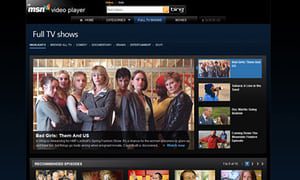
Microsoft’s MSN Video is to launch a free catch-up TV service in the UK on Thursday to try to compete with the BBC’s iPlayer – but including 30-second adverts before, during and after each programme.
The iPlayer, which like the original BBC content has no ads, is one of the most popular websites in the UK, allowing people to view or listen to TV and radio programmes up to seven days after their transmission.
Led by Ashley Highfield, formerly a key figure in the evolution of the BBC iPlayer, the Microsoft offering will have roughly 1,000 hours of programming – but will lack direct broadcaster deals. That means it will not be able to compete directly with the direct catch-up services offered by the BBC, ITV and Channel 4. Highfield is now the head of Microsoft’s UK consumer and online business.
Instead, last summer Microsoft acquired licenses for 300 hours of BBC Worldwide and All3Media shows for a trial service, getting access to BBC programmes such as Mock the Week, What Not To Wear and Hotel Babylon, and All3Media shows including Peep Show, Shameless and How To Look Good Naked, and series featuring the illusionist Derren Brown.
From Thursday it will also add more shows from Endemol, maker of Big Brother, as well as RDF, Shed, Digital Rights Group, Raw Cut and Content Film, bringing the total available to more than 1,000 hours.
“The six-month pilot is going full commercial launch,” MSN UK executive producer Peter Bale told paidContentUK, owned by the Guardian. “The pilot has worked. We’ve had a terrific response from our advertisers.” He added that “We’re having a very high number of people sit through the ads, because there aren’t many.”
The move by MSN comes amid upheavals in the online video sector, where the BBC is still waiting for approval for Project Canvas, a planned joint venture with ITV, Channel 4, Channel Five, BT and Carphone Warehouse to provide on-demand video over the internet which could be played in internet-enabled TVs, rather than just computers – the present limitation of iPlayer. BSkyB and equipment makers have voiced objections to Canvas, suggesting that there is not proven consumer demand for it, and that it might not work with planned internet-enabled TVs.
The iPlayer has enjoyed spectacular success since its launch at Christmas 2007, becoming an internet phenomenon that has provided the baseline for future broadband quality enshrined in the government’s Digital Economy bill. The bill specifies a proposed minimum broadband connection for every household of 2 megabits per second – the minimum required for iPlayer viewing.
Figures released last May showed that it was used to transfer 7 petabytes – 7m gigabytes – of data in a month. It has also recently added an “HD” option for higher-quality online viewing.
But Highfield says that the MSN product is superior to the iPlayer. MSN’s average viewer watched for 25 minutes, he said: “That is significantly higher than ITV and Channel 4’s online TV services, which suggests we are hitting the mark with our choice of content for the service.”
The MSN system offers Microsoft’s Silverlight technology to stream the video, automatically adjusting the screen quality to meet the speed of the connection. But it will be usable without Silverlight.
However, without direct broadcaster deals, MSN’s video offering won’t necessarily pose a direct challenge to the likes of YouTube and SeeSaw, which have each won Channel 4 and Five shows by offering those broadcasters control of their own ad sales.
Bale insisted that MSN is keen to sign such a deal. “We always talk to the broadcasters,” he said. “It’s publicly obvious that ITV and Channel 4 have made different decisions what their current video-on-demand strategy is.”